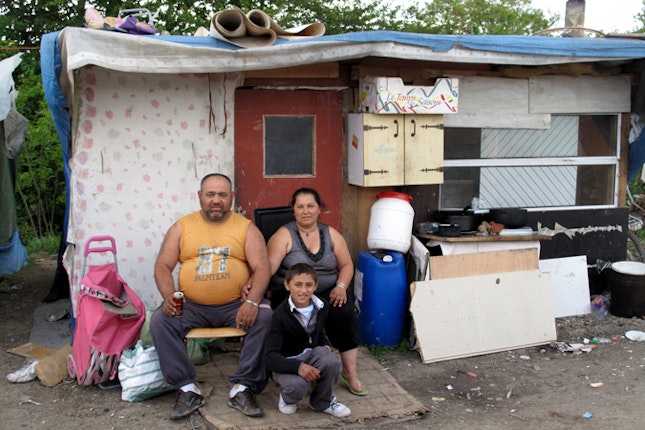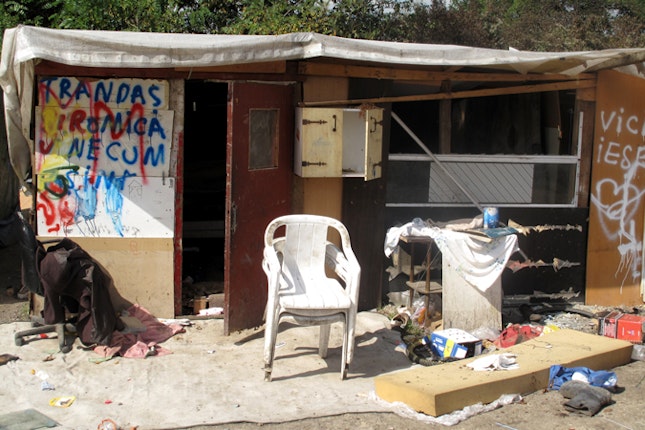Roma in Political Life: From Romania to France—Roma Migrants
By Chuck Sudetic
Citizens of Romania are today free to establish legal residence anywhere in the European Union, including France. In the late 1990s, Roma migrants, primarily from Romania, had already begun converging on France.
They had plenty of incentives to do so. They could fill demand for low-wage, under-the-table workers. Begging, prostitution, and petty crime are more lucrative in France than in Romania. Even the limited social services available to migrants in France are more generous than the services available to Roma in Romania. The French language is easily mastered by speakers of Romanian. Living conditions for most Roma in Romania’s ghettos are worse than those in the illegal Roma squatter camps of France. And France’s prisons are vacation spas compared with Romania’s.
“We left Romania because we were starving,” said Doina, a 44-year-old Roma woman from Piteşti, Romania, who was residing in an illegal squatter camp outside Paris in May 2012. “Here, at least, we can survive. So many French people are so kind.”
For years, official French efforts to deal with Roma migrants and their squatter camps had one underlying theme: to create conditions difficult enough to drive away the migrants already in the country and to deter new migrants from coming. The dirty work largely fell to local officials, generally people who do not want illegal migrants irritating their constituents. Many local officials court votes by overstating the magnitude and gravity of the migrant issue, tapping into the prejudice some French people have against Roma. Local officials have resorted to the courts and the national police to issue and execute eviction orders, which effectively pass the migrants on to other jurisdictions whose officials inevitably pass them on yet again.
For a time, France’s national government gave 300 euros per adult, 100 euros per child, and a free airline ticket for each Roma migrant volunteering to leave France and return to Romania. But this measure provided a Roma family of five with a profit that exceeded the annual income of many Roma families living in ghettos in Romania. Many migrants who accepted the handouts simply returned to France. Romania’s government has little incentive to halt Roma emigration.
French society is split over how it regards Roma migrants. On the one hand, a small army of French lawyers and activists, many of them Roman Catholic and Evangelical Christians, volunteer their time to assist Roma migrants. There are also people who support the migrant Roma, at least tacitly, because they entertain romantic fantasies about “Gypsies.”
On the other hand, many people in France harbor an angry, racist hatred of Roma and consider them nothing more than “Gypsy thieves.”
“If I catch one, I’ll take him by the ears and throw him onto the street,” said the Basque owner of a restaurant near the Gare du Nord. “If I go to the police, the Gypsy will look me in the eye and say, ‘I’ll be out in ten minutes.’ Right wingers have circulated leaflets whipping up hysteria about a “Gypsy invasion.” Clashes have erupted in and around Roma camps. Arsonists have attacked Roma settlements.
Of course, racist discourse and violence solve nothing. “These are ordinary migrants, people looking for better lives,” said Henri Braun, a lawyer who has for years represented Roma migrants pro bono. “Many Roma who arrived in France with nothing thirty years ago are now living in apartments and doing fine. Their children have gone to school and now have careers. So the problem is not inherently with the Roma. The problem is racism, the same racism that existed in France a century ago, only then it was primarily anti-Semitic. Solving this problem requires guaranteeing equal rights and eliminating racist speech, some of which is already illegal in France.”
Roma migrants from Romania are not allowed to hold many jobs in France, and very few receive state assistance. Many Roma migrants express scant interest in settling in France as tax- and rent-paying holders of French resident cards or passports. Many say their goal is to save money in order to build a house in Romania, and this requires keeping their cost of living in France to an absolute minimum.
Young people sell newspapers on the street or squeegee windshields. Some people labor on farms or for landscaping, moving, and construction companies—jobs that allow for significant savings only if taxes can be evaded. Some collect and sell discarded plastic and metal to scrap dealers, though it angers the locals when the Roma steal, say, manhole covers or copper wiring, or when they leave a mess after rifling through neighborhood trash bins.
Some Roma migrants comb forests on private land to gather cépe mushrooms to sell to fine restaurants; others pinch flowers and vegetables from private gardens and sell them in green markets or on the street. Musicians pass the hat on trains, station platforms, and street corners. Some Roma—especially younger people—take to the Gare du Nord, the Champs d’Elysées, the Boulevard St. Germain, and other tourist hubs to beg and to prey upon travelers, picking pockets, soliciting donations for “deaf-mutes” and other people in need, and fleecing the naïve with rings of “gold.”
In late 2002, Nicolas Sarkozy, the son of an immigrant to France from Hungary, launched the first in a series of publicity-grabbing crackdowns on migrants that would punctuate his tenures as France’s security minister and, later, as the Republic’s president. On December 3, hundreds of police in riot gear descended upon two squatter camps.
Since then, the police have carried out dozens of raids and expulsion operations on Roma camps. Roma migrants have been beaten. Some police officers have allegedly confiscated or stolen money carried by migrant Roma caught begging. The law of France was amended to allow the government to deport citizens of other European Union countries who remain on the territory of France for longer than three months unless they have become officially employed or enrolled in school.
In 2010, President Sarkozy saw fit to call an unprecedented, well-publicized meeting of the government dedicated in part to the Roma and crime. In public statements, high ranking officials, including the minister of the interior, associated the Roma with criminality. Sarkozy himself specifically referred to illegal, Roma-inhabited camps as sources of crime and called upon the ministries to dismantle them within three months. Large-scale, highly publicized expulsions had already begun.
In August 2010, a government order instructed local authorities to dismantle “illegal camps,” explicitly prioritizing those inhabited by Roma. The government endured a flood of criticism and revised the order by removing the specific reference to Roma, but by then the message was clear. According to the government and nongovernmental organizations, from January to October 2011 more than 13,000 citizens of Romania and Bulgaria were expelled from more than 100 camp sites.
Sarkozy backed down after the European Commission announced an intention to initiate legal proceedings against France for infringement of the European Union’s charter. A Council of Europe report later found that France’s deportation of thousands of Roma from Romania and Bulgaria in 2010 was based upon discriminatory laws specifically targeting Roma individuals and their families, that “voluntary” returns were actually forced expulsions, and that the destruction of hundreds of illegal Roma camps was discriminatory and violated human rights. The police went on to raze still more squatter camps in 2011 and repatriated another 33,000 migrants, about a third of them Roma from Romania.
D.D.’s Squatter Camp in Sucy-en-Brie
D.D. is a Roma man in his early 20s. At about the age of 10, he migrated with his family to France from Buzescu, a town in south central Romania famous for wealthy Roma involved in organized crime. Soon after arriving, D.D. began helping his family make ends meet by “working” at the Gare du Nord and lesser rail stations.
D.D. begged beside his mother during the early years. He later played a flute and sang for coins. Now, he says, there is money to be made by dressing up in a shirt, tie, and sport coat and helping foreign travelers work the ticket, snapshot, and candy machines. The cops chase D.D. away. D.D. returns.
In May 2012, D.D. was expecting the national police to evict him and the rest of his family from the vacant lot they had been occupying in Sucy-en-Brie, a Paris suburb, for six months. All of the 200 or so migrants from Romania squatting there were expecting the police to haul them off for deportation.
“I was expelled in April and another time two months before that,” said one of D.D.’s neighbors, a 47-year-old mother named Marie. “I spent nights on the street with five kids in January and February. We found another place for a while. Then we came here. We were lucky. But each time we have to rebuild.”
D.D. and the other migrants had arranged their campers and shacks in neat rows. Generations of women and girls were keeping the interiors impeccably clean. Most able-bodied men and women went off to make money early each morning, leaving the kids to the young girls and grandparents.
The camp existed in violation of a battery of laws, decrees, and ordinances. The migrants had surrounded their shacks and campers with an unsightly chaos of scavenged scrap metal, furniture, and wood, plastic toys, rugs, tires, and cars on blocks. They fired up portable generators to light their homes and run power tools, refrigerators, televisions, satellite television receivers, and music players.
They burned almost anything to heat their shacks and campers, cook their food, and boil their babies’ clothing. They cranked open fire hydrants to draw water for drinking, bathing, and washing. They enjoyed no toilet facilities. After months of requests, Sucy-en-Brie’s local authorities provided the migrants with a single dumpster; once it had filled, the people discarded their refuse among the saplings and tall grass along the camp’s fringe.
Migrants generally turn to public health clinics and hospital emergency rooms to obtain medical care, especially for infants and pregnant women. Almost none of the children attend school, because school officials refuse to admit them. So from their pre-teens, many of the migrant kids meander freely through Paris—jumping turnstiles, running and shouting, panhandling, looking for odd jobs, and, for some, snatching cell phones, wallets, and loose change from the tables of outdoor cafés.
Police officers in Sucy-en-Brie said the migrant Roma there posed no significant crime threat. “No murders, no rapes, no gun crimes, no robberies,” said one police officer. “A few vegetables taken from gardens, a few cellphones and some cash snatched from café tables … that’s all.”
“They’d come into town on market days,” said one Arab barista. “Sometimes they’d order a coffee and run off without paying, and sometimes they’d throw litter on the ground. That’s about it here. In a neighboring town, people complained that the Roma were parking along the river and were burning campfires.”
Jérôme Karsenti, another lawyer who represents migrant Roma pro bono, resides in Sucy-en-Brie and is a Socialist Party member of its council. “The migrant issue divides the townspeople,” he said. “Some are for kicking them out. Some, even supporters of right-wing parties, are for assisting them.”
After about 30 Roma migrants occupied an abandoned factory building in 2008, local residents, including a school principal and a drugstore owner, organized a solidarity movement to assist the migrants in a way that would keep their families together and develop a lasting solution to their needs, including enrollment of their children in school. The movement circulated a petition to raise awareness in the town hall.
D.D.’s group of about 200 showed up in the vacant lot practically overnight in late 2011. Their reception was different. Some local residents distributed fliers warning that the city would be flooded by a wave of thieving “Romanians.” In April 2012, D.D. and his neighbors received official eviction notices and orders to leave France.
A regulation supposedly bars France’s national police from arriving before six a.m. to uproot squatters. But D.D. and the other migrants in the vacant lot in Sucy-en-Brie figured the police would show up hours before dawn, when everyone was around. Haste is the rule when clearing out: Gather the birth certificates, the passports, the mobile phones. Pack the kids, the carpets, the toys, the stove, and the bedding into the car or van or house trailer, or strap them onto your back. Abandon anything you can scavenge elsewhere.
In early May 2012, a Socialist, François Hollande, defeated the incumbent Sarkozy to become president of France. A month later, voters gave the Socialists a majority of seats in the country’s National Assembly. Hollande pledged to end routine evictions and deportations of illegal migrants and to seek solutions for dealing with their problems without attracting a tidal wave of new migrants seeking better lives.
Over the summer, a court ordered D.D. and the migrants to remove themselves from the vacant lot by September 15. Two weeks before the deadline, men and women from the Sucy-en-Brie site began seeking a new place to settle. By the deadline date, everyone had moved to a new camp in another Paris suburb.
“If they kick me out again,” D.D. said, “I will get on the phone, call family and friends, and find another place. If I am deported, I will come back again.”
This article is part of a series examining Roma political participation in France, Hungary, Romania, Macedonia, Bulgaria, and the Czech Republic.
Until November 2013, Chuck Sudetic was a senior writer for the Open Society Foundations.






